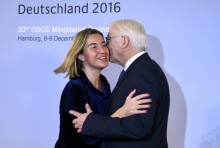As expected, the scheduled meeting of the Council of Foreign Ministers of the Organization for Security and Cooperation in Europe (OSCE), which took place in Hamburg recently, did not see any progress in solving the problems facing Europe, including the conflict in the Donbas. In fact, its participants delivered their declarations, their visions, and no one suggested any concrete steps to resolve existing conflicts. However, key players’ speeches were quite telling.
For example, Minister of Foreign Affairs of Germany Frank-Walter Steinmeier, who opened the meeting, accused all parties to the conflict in eastern Ukraine of unwillingness to achieve progress in the peace settlement. “No large organization will be able to achieve a truce if there is no political will,” he said. According to him, peace agreements are considered “more as guidelines than as binding commitments.” So the German foreign minister called the situation unsatisfactory and demanded above all a new strong impetus for the withdrawal of heavy weapons and determining the layout of the line of contact. However, Steinmeier also reminded those present that the international community was not going to tolerate Russia’s illegal annexation of Ukrainian Crimea. “Its annexation violated international law. OSCE structures are still blocked from access,” head of the German Ministry of Foreign Affairs (MFA) was quoted as saying by the AFP.
EU High Representative for Foreign Affairs and Security Policy Federica Mogherini was blunter and franker as she accused Russia of undermining the principles of the European security by its actions in Crimea and the Donbas.
“The illegal annexation of Crimea and Russia’s destabilizing actions in eastern Ukraine are blatant violations of the OSCE principles and international law. The EU does not recognize this annexation and will continue to call on Russia to reconsider its actions. In addition, we will continue to call for a ceasefire in eastern Ukraine and full implementation of the Minsk Agreements by all parties,” she said in her speech.
Similarly, US Secretary of State John Kerry once again accused Russia of committing a violation of international law with its annexation of Ukrainian Crimea and condemned its “aggression” in eastern Ukraine.
In response, head of Russian MFA Sergey Lavrov called on the West to stop “spouting bellicose rhetoric” and called the Russian threat a “myth.” Lavrov expressed his belief that to resolve the conflict in the Donbas, the government in Kyiv needed to engage in direct talks with the pro-Russian separatists, which talks are rejected outright by the Ukrainian authorities.
In turn, Minister for Foreign Affairs of Ukraine Pavlo Klimkin emphasized that “legalization of the Russian protectorate in the Donbas” was absolutely unacceptable for Ukraine and contradicted the Minsk Agreements, Interfax-Ukraine reports.
“The conflict which Russia created and fomented will not be resolved until Russia leaves not only the Donbas, but also Crimea and Sevastopol, which remain part of Ukraine. We cannot sacrifice and retreat on key principles,” Klimkin said. He stressed that the sanctions had an impact on Russia, and so they had to be maintained. “A combination of sanctions and other pressure on Russia has curtailed its capabilities, but that nation has not stopped its aggression yet,” the minister stressed. “The sanctions should remain in place until Russia leaves the Ukrainian territory,” head of the Ukrainian MFA emphasized.








